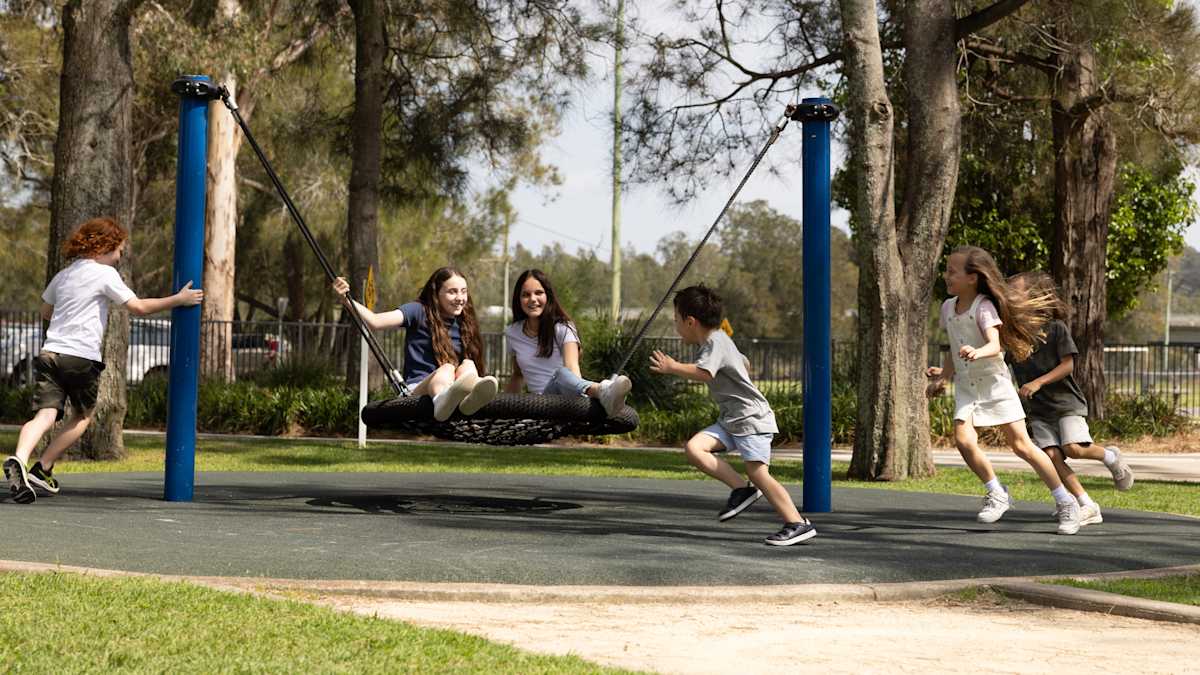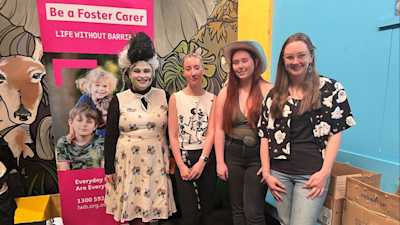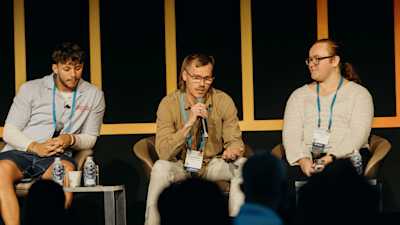The Stable Foundations staffing structure provides consistency and stability for children in out-of-home care.

Image: A group of children running around a large swing at a park.
Having an ongoing relationship with care providers is what children and young people we support have told us is important to them. They want to know that the person who is putting them to bed will be the same person waking them up in the morning.
Julie (9), Stephen (5) and Jacob (2)* are siblings with a range of health and care needs. It was very important to them that they stay together and crucial that they remained on Country. This helped to maintain their cultural connections and the connection with their mother.
The Life Without Barriers team knew how important reunification was for these children and their kin. While that process was underway, their care team created a welcoming environment with consistent carers which helped to develop trust and positive relationships.
A focus on the consistency of carers and support staff is part of the new Stable Foundations staffing structure. It is designed especially to meet the needs of children and young people in out-of-home care.
The Stable Foundations staffing structure provides care through two primary carers who alternate weekly, with one carer living in the home for seven days while the other is off duty. A residential staff team also provides additional support after school and on weekends.
This rostering system enabled the siblings to develop strong relationships with the people supporting them which is consistent with the principles of the CARE model. It also meant that they could participate in the hobbies they loved including dancing, gymnastics and swimming.
Most importantly, it meant we could support the children to spend time with their mother. During one visit, Life Without Barriers supported the children on a return to Country trip. They spent quality time with their mum, respective fathers, and extended family members. It was a highlight for the children and everyone involved.
Julie developed a particularly good relationship with Youth Worker Tim.
“He comes back every week with a big smile on his face, he is always happy to see us and we have so much fun with him,” Julie said.
“He helps us feel better when we are sad. He puts up photos of all of us all over the house and some are even from when we are with our mum, nan and pop that we didn’t know he had.”
“He just makes me feel so safe when he is here.”
Julie was so grateful for the support she received from Tim that she worked with Operations Manager Amanda Prime and Director Claire Boardman to nominate Tim for the Youth Worker of the Year Award.
In her submission, she gave the example of the many ways Tim would go above and beyond to help their family.
“He made dinner for our big sister (19) once when she was sad after contact, and he dropped her off at the airport,” said Julie.
Over the course of a year, the time that the children and their mum had together grew from supervised family time in the park, to visits in the community, to parent visits at school and finally, to the children’s mum visiting the children’s house and caring for the children.
Happily, the three siblings were successfully reunified and now live with their mum.
The Stable Foundations model was developed in response to feedback from the Department, which Helen Nys, Director, Child, Youth and Family WA, said was also echoed by the young people we spoke to.
“Young people said they wanted more sustained relationships with staff,” Helen shared.
“To know the person who was putting them to bed is the same person who would be there in the morning, that consistency of care has been constant feedback from young people.”
A person's story is precious. We take storytelling seriously. Sometimes people are able to tell their own story, and we love that. We always make sure they give us their ok, and we will always honour the trust placed in us to bring their story forward.
*Names have been changed to protect the children and young people in this story.
Transformation Project
Life Without Barriers is committed to Closing The Gap and ensuring Aboriginal children can grow in culture, with family and kin. We will progressively step away from providing out-of-home care services to Aboriginal and Torres Strait Islander children by 2031”.
While reunification with family is our first aim, we are committed to ensuring Aboriginal and Torres Strait Islander children are supported by community-controlled organisations. View the Transition Roadmap here.
Our Transformation Project involves three key commitments:
Transition all Aboriginal and Torres Strait Islander children and young people in our care to Aboriginal Community Controlled Organisations (ACCOs).
Influence the sector to join together to reduce the over-representation of Aboriginal and Torres Strait Islander children in out-of-home care and prevent entry into care.
Advocate for ACCOs to receive support to lead community.
Our Transition Roadmap was developed in partnership with SNAICC – National Voice for our Children and shows how we are accountable to our national partner and to Aboriginal and Torres Strait Islander children and young people and their right to grow in culture and with kin.


